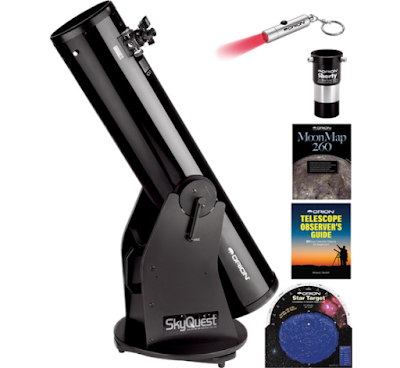If you're of the 2nd variety, you may not own a telescope on the grounds, that, "they're, just too expensive!" Well, some telescopes ARE too expensive! - like those, situated beneath state-of-the-art observatory domes on the summits of Mauna Kea, and Mauna Loa, in the Hawaiian Islands. Now, THAT'S too expensive; for most of us, anyway.
Believe it or not - there are telescopes on the market, that actually approach the optical quality, and sizes, of some of those gems of the tropics. And, there are some that DON'T! And, it's the ones that don't - that are the, truly, expensive items! I will stay clear of those kinds of "powerful", "600X"-type "mockeries", except to give a brief overview and tell you where they can most likely be found.
 |
| Orion StarBlast 4.5 Astro Reflector Telescope Kit. |
Certain kinds of telescopes, or, maybe more accurately, items that LOOK like real telescopes, that are marketed using high, but, ambiguous numbers - are likely to have the overall construction, as well as, overall usefulness, of a high-priced "toy". Although there are some rare exceptions, any type of optical instrument sold by department stores, or other chain store outlets, is likely to consist, mostly, of hype - and disappointment. Don't buy one. I could write a short book on my reasons for telling you that (maybe I will!) - but, not here.
There. That's that! Now, let's look at real, astronomical optical instruments that are available for the non-rich, amateur astronomer, or anyone else who wishes to acquire a well-made optical instrument, for other purposes, as well (I understand that "other" purposes exist - but, I'm not familiar with any of them!)
 |
| Orion SkyQuest XT8 Classic Dobsonian Telescope Kit. |
This will be short, and sweet, mainly because I only know of one telescope manufacturer which meets all, of what, I consider, the most important criteria: quality, price, available accessories, reputation, and general knowledge of telescopes - based on my experience and familiarity them: Orion Telescopes and Binoculars of Cupertino, California.
Because of the necessity of variety, and of combinations of variety - much of it aimed at the more advanced, "intermediate" amateur astronomer - Orion carries many types of telescopes, and telescope 'packages', which, I cannot possibly give decent coverage to here, so, before I briefly go over a few of their more 'general-purpose' telescopes, I'll just mention that, they also carry instruments for the advanced amateur, as well as, professional astronomer.
I will note here - NEVER buy a telescope, based on advertisements of "power". I think that statement should be embossed on every telescope's packaging, just above, "DO NOT USE TO LOOK DIRECTLY AT THE SUN". Any telescope, in theory, can provide high, even very high magnifications. That's not what you're interested in. Advertising a telescope by "power"-"magnification", is a marketing device. It's done, only because it can be, and it sounds so good. But, magnification is the least of your concerns; aperture - is a major concern. The cost is a close second.
 |
| Orion SkyQuest XX12g GoTo Truss Tube Dobsonian Telescope. |
There are a few, basic types of scopes: Refractors, Reflectors, and Cassegrainian, "folded" optics types. All of these come in a variety of aperture sizes. Refractors, typically, are in the smaller ranges, mainly because they are more expensive to make. Reflectors, come in small, medium, and large. Folded optics types, come in medium and large. My recommendation, for a beginner, is to purchase a reflector telescope of at least a 4-4.5-inch aperture, but that's because I'm partial to reflectors, and there, generally, larger apertures.
Here are three scopes from Orion, that I recommend for someone who has never before purchased a telescope, and/or, is a beginning-intermediate amateur astronomer. Prices are, as of their latest catalog.
- StarBlast 4.5 Astro Reflector Telescope Kit: This is a 4.5-inch tabletop model, swivel-base, Dobsonian mounting, and is supplied with two eyepieces (for change of magnification) - 17mm and 6mm (26x and 75x, respectively). 0-power finder-scope. This model features an alt-azimuth dual-axis system for manual repositioning. Best suited for the beginner. Good for observing the moon, planets, and brighter deep-space objects.
- Orion SkyQuest XT8 Classic Dobsonian Telescope Kit: An 8-inch "floor" model-style, Dobsonian mounting. Comes with 2x Barlow lens (doubling mag. of the eyepieces): 35mm and 25mm (34x, 48x, 68x, and 96x w/Barlow) and 0-power finder-scope. This model features an alt-azimuth dual-axis system for manual repositioning. Best suited for, beginner-intermediate. Good for observing the moon, planets, and dimmer deep-space objects.
- Orion SkyQuest XX12g GoTo Truss Tube Dobsonian: This telescope is my personal "dream-scope". 12-inch aperture, computerized "GoTo" drive mechanism. Laser-based finder-scope. This model features the GoTo computer-automated drive. Stepper-motors, on both axes, and a hand-held computer controller, allow automatic repositioning of the telescope, based on controller input (keyed or voice). Includes 28mm and 12.5mm eyepieces and 2x Barlow (54x, 108x, 120x, and 240x). Best suited for intermediate-advanced amateurs. Good for observing the moon, planets, and harder-to-reach deep-space objects, such as distant galaxies.
I could continue down the list, as, there are other models in all of the classes I've mentioned, with varying degrees of accessory inclusion. All of the models mentioned here will be very good for observing a variety of celestial objects. Orion carries an entire line of accessories, from extra eyepieces, and solar filters, to planetary and deep-space digital CCD cameras and adapters. Your best bet, though, is to view their current, full catalog online, at telescope.com.
Unfortunately, they no longer provide a real, paper catalog! But, according to their associate, Rick, they will likely be back (as soon as people realize that, paper, is actually, a much faster, more intuitive browse than a screen!)
Dale Alan Bryant
Senior Contributing Science Writer


No comments:
Post a Comment